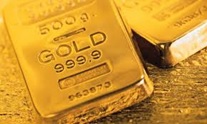2016 Welcomed Gold
 Yesterday, the global stock market tumbled. What does it mean for the global economy and the gold market?
Yesterday, the global stock market tumbled. What does it mean for the global economy and the gold market?World shares sold off sharply on the first trading day of 2016. Shanghai equities plunged 7 percent, the Frankfurt stock market dove 4.3 percent, London equities lost 2.4 percent, while the S&P500 dropped 1.5 percent. What is going on?
As in August, the global sell-off was triggered by poor Chinese economic data and the following China’s stock collapse. The country’s manufacturing activity contracted for the 10th straight month in December, which revived concerns about China’s economic slowdown. And rightly so! In our October Market Overview, we correctly predicted: “the current slowdown of China’s economy is likely to stay” and “the slowdown will be gradual, however it may include many shocks along the way”. The panic sell-off in China was triggered also by investors selling shares ahead of the imminent ending of a share sales ban imposed on the listed companies’ major shareholders. It shows that the Chinese stock market is artificially kept alive by regulators, because when market forces are allowed to operate, equities fall.
Two more factors contributed to the global sell-off. First, the Shanghai stock market halted trading, which set a bad precedent for the year ahead. Second, tensions between Iran and Saudi Arabia deepened, which added to the negative sentiment and prompted investors to replace stocks by safe-haven assets, like gold.
Indeed, the shiny metal gained 2 percent on Monday, climbing to $1082.25 (London PM Fix). The increased risk aversion may change the sentiment towards gold (especially when investors reduce the odds for Fed’s second hike in March), however, investors should remember that the U.S. economy remains the most important factor shaping the price of gold. Thus, the Chinese economic slowdown would spur safe-haven demand for gold only if we see contagion in the global currency markets or the U.S. stock markets. The key is what happens in the coming days.
To sum up, China’s stock market plunged again, which triggered a panic sell-off all over the world. If the perturbations continue, gold should gain as a safe-haven asset. Consequently, the Fed would be less likely to raise interest rates during a correction in the stock market. However, investors should remain calm. The August global sell-off neither triggered a US recession, nor boosted the price of gold in a sustainable manner.
If you enjoyed the above analysis, we invite you to check out our other services dedicated to the precious metals investors. We invite you to join our gold newsletter today – you’ll also gain 7-day trial of our premium Gold& Silver Trading Alerts. It’s free and if you don’t like it, you can easily unsubscribe.
Arkadiusz Sieron
Sunshine Profits‘ Gold News Monitor and Market Overview Editor















